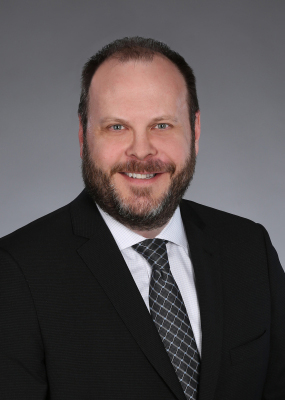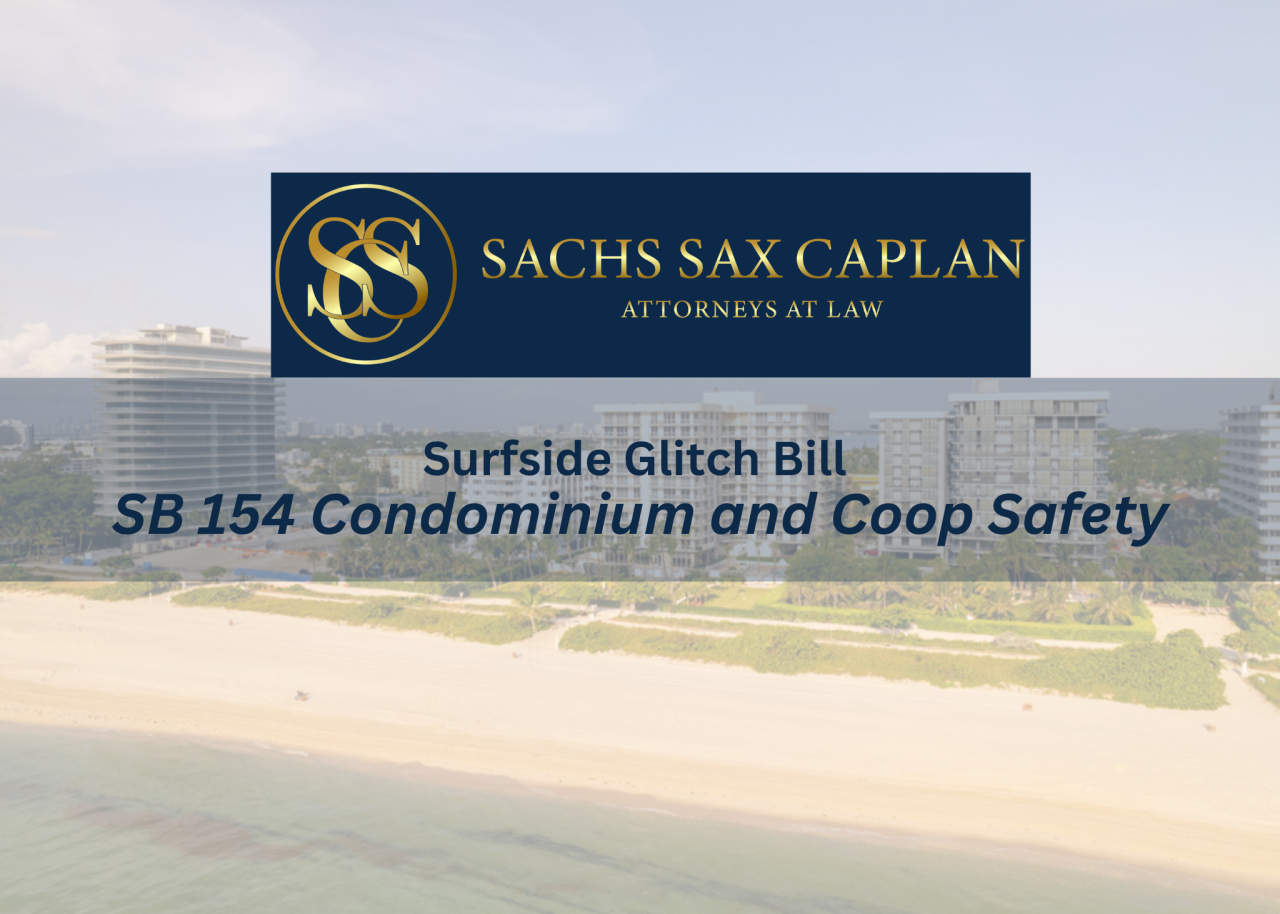
Part 2 of Understanding Changes to Florida Statutes for Condominiums,Cooperatives and HOAs: SB-154 Condominium and Coop Safety (Surfside Glitch Bill)
Understanding SB 154 - Condominium and Coop Safety (Surfside Glitch Bill)
Effective June 9, 2023, except as otherwise indicated herein
This bill was passed in response to the surfside legislation passed last year, namely SB4D. This legislation clarifies many of the open issues and concerns that Associations were faced with after last year’s legislative session. Applies to Condominiums and Cooperatives.
Milestone Inspections
The legislature clarified that the requirements for the milestone inspections and structural integrity reserve studies apply only to residential Condominiums and Cooperatives, and not commercial Condominiums or Commercial Cooperatives. Note, the residential portion of a mixed use Condominium or mixed use Cooperative is subject to the milestone inspection and structural integrity reserve study requirements.
The previous legislation differentiated between Condominiums and Cooperatives that were within three (3) miles of the coastline versus those that were not located within three (3) miles of a coastline. The coastline analysis has now been removed, and all condominium or cooperative buildings that are three (3) or more stories must conduct their milestone inspections within thirty (30) years of the building’s certificate of occupancy (the “30 Year Mark”), unless an earlier inspection (i.e., within twenty-five (25) years of certificate of occupancy) is justified by a local enforcement agency taking into account certain environmental factors, such as proximity to salt water.
The legislature expanded who could perform the milestone inspection so that it could be performed by a “team of professionals,” with an engineer or licensed architect acting as the person responsible.
The bill authorizes local enforcement agencies to extend the deadline for a building if it can be shown with good cause that the building has entered into a contract with an engineer or architect before the deadline but that the report cannot be reasonably completed prior to then.
The bill specifies that the association must notify the membership of the deadline to complete a milestone inspection within 14 days of notice from the local enforcement agency that a milestone inspection is required.
The bill further permits the local enforcement agency to accept a report issued by an engineer or architect that inspected the building prior to July 1, 2022, if the inspection and report substantially complies with the statutory milestone reporting requirements.
The bill revises the deadline for the initial milestone inspection to be performed within 30 Year Mark as follows:
- If the 30 Year Mark is before 7/1/22, the deadline is 12/31/24.
- If the 30 Year Mark is between 7/2/22 – 12/31/24, the deadline is now 12/31/25.
Reserve Study/Reserves
In regard to reserves, the bill does the following:
Provides that any association required to complete a milestone inspection must have the initial structural integrity reserve study completed no later than 12/31/24, with the possibility of extending until 12/31/26 in certain circumstances.
Clarifies that any budget adopted on or after December 31, 2024, must include fully funded reserves for those items specified in the Structural Integrity Reserve Study and that members cannot vote to waive or reduce the funding of such reserves or use such reserves for other purposes. However, this is only for buildings three stories in height or more.
For those buildings less than three (3) stories in height, or for the non-structural integrity reserves for buildings three (3) stories or higher, while Associations may still waive reserves, they now can only waive such reserves by a vote of a majority of the total voting interests of the Association.
The legislature expanded who may perform the visual inspection or prepare the reserve study to include reserve specialists and other certified reserve professionals as recognized by the Community Associations Institute or the Association of Professional Reserve Analysts.
Clarifies that reserve funding only applies to items that the association is responsible to maintain, repair or replace. For example, if windows are the responsibility of the owners under the association documents, the association would not have to reserve for such windows.
Provides for a definition of “Alternative Funding Methods” which may be used for multi condominium associations operating at least 25 condominiums. Does not provide specificity as to what these alternative funding methods may include and leaves it up to the Division (DBPR) to adopt rules or policies for the alternative funding of capital expenditures and deferred maintenance obligations.
Removes “Floor” and “Foundation” from the list of items the association is responsible to reserve for as part of the structural integrity reserves for any building three (3) stories or higher.
Adds “exterior doors” to the list of items the association is responsible to reserve for as part of the structural integrity reserves for any building three (3) stories or higher.
Provides that you do not have to have reserves for replacements of items where the estimated remaining useful life is more than 25 years or is not ascertainable. However, you must still reserve for deferred maintenance and repairs of such items.
Miscellaneous
The bill also:
Excludes insurance premiums from being taken into account when determining whether a budget increase of 115% will trigger the ability of members to propose a substitute budget.
Condominium and Cooperative owners insured by Citizens are no longer required to purchase flood insurance.
Disputes related to the milestone inspection or reserve funding requirements shall be required to go through pre-suit mediation as a prerequisite to litigation as opposed to arbitration. This does not take effect until July 1, 2027.
Expands access to records to provide that a unit owner and their authorized representative are allowed to inspect records. Previously, the statute provided that either the unit owner or their authorized representative may inspect records.
Requires the developer to provide a turnover inspection report upon turnover as opposed to a completed milestone inspection report. A turnover inspection report attests to the required maintenance, condition, useful life, and replacement costs for the following (regardless of the c/o date or the height of the building):
- Roof, structure (including load bearing walls & structural members), fireproofing & fire protection systems, plumbing, electrical systems, windows & exterior doors
- Elevators, heating & cooling systems, pool/spa and equipment, seawalls, pavement & parking areas, drainage systems, and irrigation systems
Requires the association to perform any maintenance identified by the developer pursuant to its turnover inspection report.
Provides additional disclosure requirements upon sale of a unit if the requirements of the milestone inspection report for structural integrity reserve study have not been completed.

Steven G. Rappaport is an Equity Partner in the Community Associations Practice Group. Mr. Rappaport handles transactional matters for the firm’s community association clients, including drafting amendments to governing documents, attending Board meetings and elections, handling covenant enforcement disputes, and providing opinions on all aspects of association issues. To learn more about Steven including how to work with him, click here.

Associate Attorney Michael Ungerbuehler has been helping community associations across the State of Florida with their legal needs for more than 20 years. In January 2018, Michael joined Sachs Sax Caplan to focus his representation of community associations in South Florida. To learn more about Michael including how to work with him, click here.
When you subscribe to the blog, we will send you an e-mail when there are new updates on the site so you wouldn't miss them.

Sachs Sax Caplan, P.L. is proud to be recognized by The Florida Bar for our commitment to hiring and developing Board Certified Attorneys.

